The Intel 9th Gen Review: Core i9-9900K, Core i7-9700K and Core i5-9600K Tested
by Ian Cutress on October 19, 2018 9:00 AM EST- Posted in
- CPUs
- Intel
- Coffee Lake
- 14++
- Core 9th Gen
- Core-S
- i9-9900K
- i7-9700K
- i5-9600K
CPU Performance: Office Tests
The Office test suite is designed to focus around more industry standard tests that focus on office workflows, system meetings, some synthetics, but we also bundle compiler performance in with this section. For users that have to evaluate hardware in general, these are usually the benchmarks that most consider.
All of our benchmark results can also be found in our benchmark engine, Bench.
PCMark 10: Industry Standard System Profiler
Futuremark, now known as UL, has developed benchmarks that have become industry standards for around two decades. The latest complete system test suite is PCMark 10, upgrading over PCMark 8 with updated tests and more OpenCL invested into use cases such as video streaming.
PCMark splits its scores into about 14 different areas, including application startup, web, spreadsheets, photo editing, rendering, video conferencing, and physics. We post all of these numbers in our benchmark database, Bench, however the key metric for the review is the overall score.
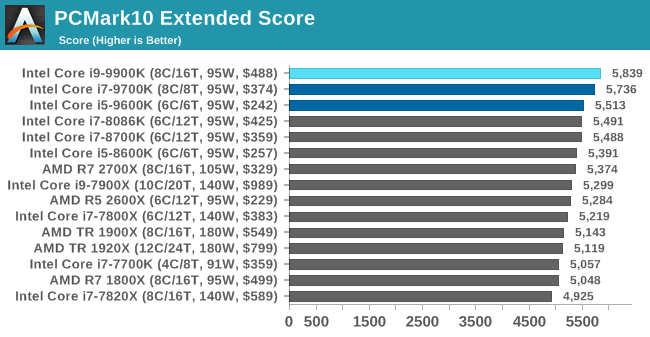
As a general mix of a lot of tests, the new processors from Intel take the top three spots, in order. Even the i5-9600K goes ahead of the i7-8086K.
Chromium Compile: Windows VC++ Compile of Chrome 56
A large number of AnandTech readers are software engineers, looking at how the hardware they use performs. While compiling a Linux kernel is ‘standard’ for the reviewers who often compile, our test is a little more varied – we are using the windows instructions to compile Chrome, specifically a Chrome 56 build from March 2017, as that was when we built the test. Google quite handily gives instructions on how to compile with Windows, along with a 400k file download for the repo.
In our test, using Google’s instructions, we use the MSVC compiler and ninja developer tools to manage the compile. As you may expect, the benchmark is variably threaded, with a mix of DRAM requirements that benefit from faster caches. Data procured in our test is the time taken for the compile, which we convert into compiles per day.
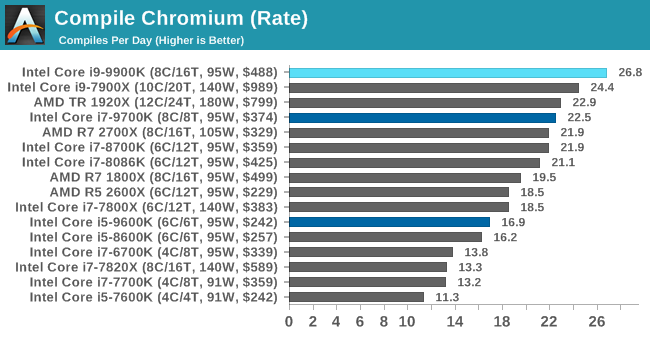
Pushing the raw frequency of the all-core turbo seems to work well in our compile test.
3DMark Physics: In-Game Physics Compute
Alongside PCMark is 3DMark, Futuremark’s (UL’s) gaming test suite. Each gaming tests consists of one or two GPU heavy scenes, along with a physics test that is indicative of when the test was written and the platform it is aimed at. The main overriding tests, in order of complexity, are Ice Storm, Cloud Gate, Sky Diver, Fire Strike, and Time Spy.
Some of the subtests offer variants, such as Ice Storm Unlimited, which is aimed at mobile platforms with an off-screen rendering, or Fire Strike Ultra which is aimed at high-end 4K systems with lots of the added features turned on. Time Spy also currently has an AVX-512 mode (which we may be using in the future).
For our tests, we report in Bench the results from every physics test, but for the sake of the review we keep it to the most demanding of each scene: Ice Storm Unlimited, Cloud Gate, Sky Diver, Fire Strike Ultra, and Time Spy.
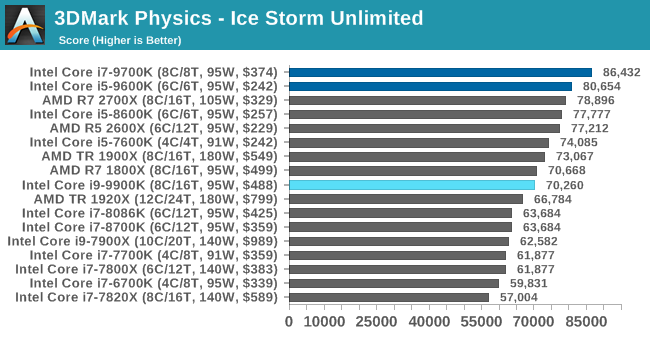
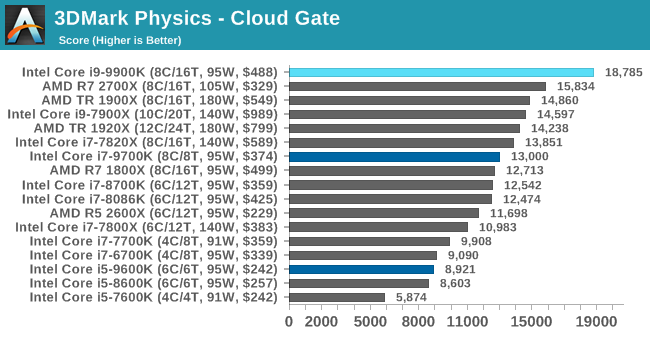
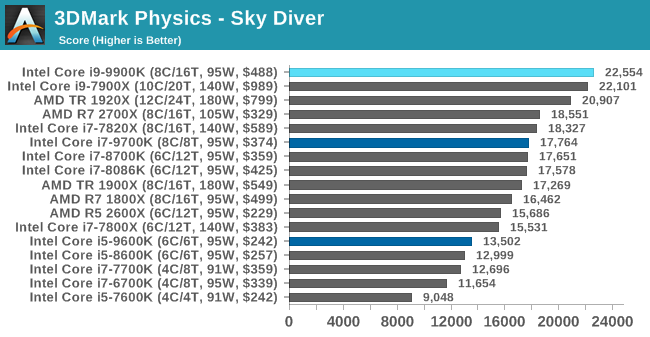
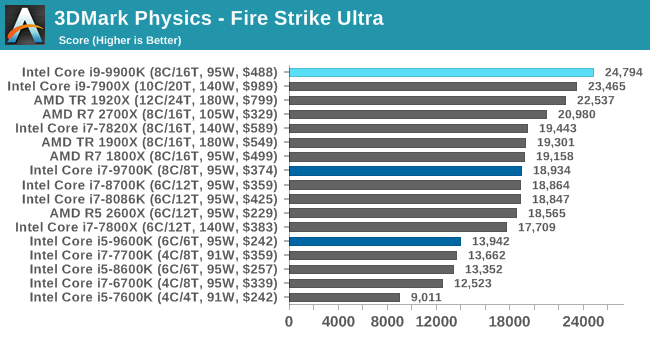
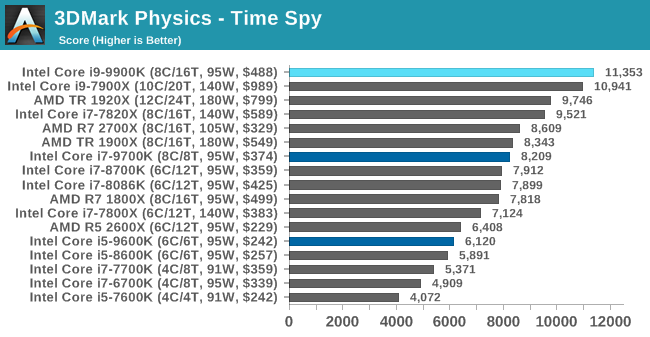
The older Ice Storm test didn't much like the Core i9-9900K, pushing it back behind the R7 1800X. For the more modern tests focused on PCs, the 9900K wins out. The lack of HT is hurting the other two parts.
GeekBench4: Synthetics
A common tool for cross-platform testing between mobile, PC, and Mac, GeekBench 4 is an ultimate exercise in synthetic testing across a range of algorithms looking for peak throughput. Tests include encryption, compression, fast Fourier transform, memory operations, n-body physics, matrix operations, histogram manipulation, and HTML parsing.
I’m including this test due to popular demand, although the results do come across as overly synthetic, and a lot of users often put a lot of weight behind the test due to the fact that it is compiled across different platforms (although with different compilers).
We record the main subtest scores (Crypto, Integer, Floating Point, Memory) in our benchmark database, but for the review we post the overall single and multi-threaded results.
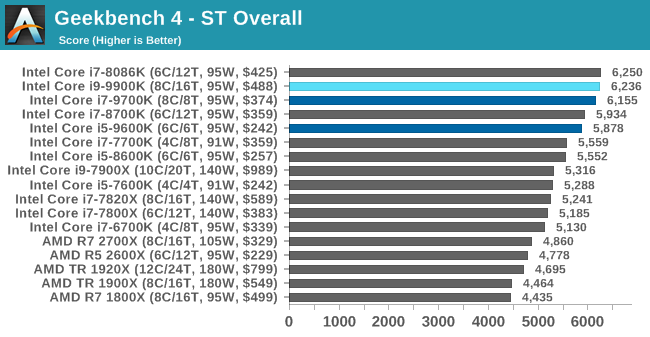
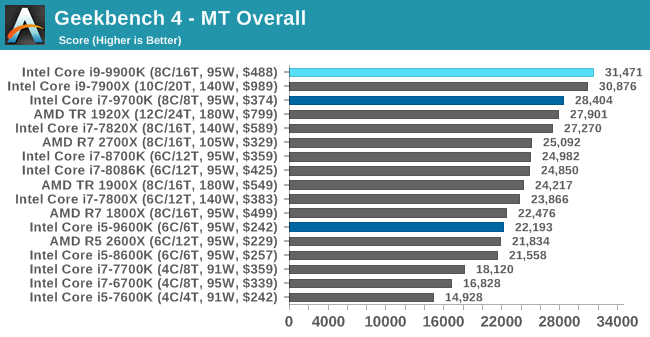










274 Comments
View All Comments
muziqaz - Monday, October 22, 2018 - link
I love the price of $488 stamped all over each of the test results, while over here in UK I see price of £599 and newegg quotes $580. Even your linked amazon has it at $580. And conclusion is awesome with: "At $488 SEP, plus a bit more for 'on-shelf price'..." Since when is extra 100 bucks a bit more? :Dcompudaze - Monday, October 22, 2018 - link
What was the actual vcore for your overclocks?HardwareDufus - Monday, October 22, 2018 - link
I7-9700k.... an I7 that isn't hyperthreaded.... let's totally muddy the waters now Intel.... Guess they had to save some feature for the I9's $100+ surcharge...… Good grief.bogda - Tuesday, October 23, 2018 - link
How pointless is reviewers comment: "... World of Tanks gives the 9900K some room to stretch its legs..."?Difference between two chips in discussion is between 712fps and 681fps! Not even Neo from Matrix could note the difference.
How pointless is discussing top of the line CPU gaming performance in 720p in any game??
How pointless is marketing 8C/16T CPU for gamers???
sseyler - Tuesday, October 23, 2018 - link
Not sure whether this has been pointed out yet, but the Threadripper prices need to be updated. For example, the 1920X is now well under $500 as advertised even on AMD's website and the 1900X goes for $350 on Newegg.dlum - Tuesday, October 23, 2018 - link
For me, listing the long-obsolete prices for AMD processors (still initial, long-outdated MSRP for 1920x $799 - whereas a simple amazon search confirms it's now for just over half of that ($431)) is clearly disrespectful and shamefull practice for a reviewer.It's very sad such dishonest practices found their way to Anandtech and they are so prominent here.
Probably that's also why no one answers nor fixes those clearly misleading figures.
(Maybe that's the cost of being able to read such anyway valuable reviews for free :)
sseyler - Thursday, October 25, 2018 - link
Well, to be fair, I'm sure the editors didn't dig this deeply through the comments. They're busy people.Also, I think I heard something mentioned before about their graphs having some semi-automatic mechanism for listing prices and the like. I don't remember exactly, but it probably has something to do with pulling MSRP data and it's difficult to change given the way the templated graphs are generated from the benchmarks.
I imagine it was done something like this for consistency across the site as well as not biasing prices according to specific vendors. Given the first reason, I don't know why it'd be difficult for individual editors to customize/tweak certain aspects, but maybe that needs to be revised to be more flexible. As for the second reason, there are clearly reasonable solutions, like finding the *current* MSRP (rather than the release MSRP), or selecting the lowest/median/average price among a pool of selected retailers.
Anyway, it doesn't make much sense to me to characterize this as an instance of dishonesty, but rather a technical detail that's important enough to invest the time in it's improvement.
sseyler - Thursday, October 25, 2018 - link
its*zodiacfml - Wednesday, October 24, 2018 - link
Meh. Intel owner could simply delidd and approach these kinds of performance.Resolution above 1080p, AMDs parts have better value.
zodiacfml - Wednesday, October 24, 2018 - link
Made the comment without reading the review. The difference is a lot smaller than I expected where the only useful difference is in Ashes where AMD usually dominates due to sheer core count.I'd be fine with that 6 core CPU from AMD.